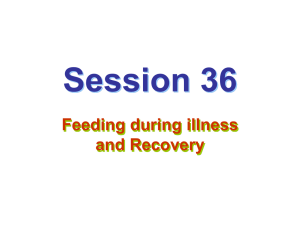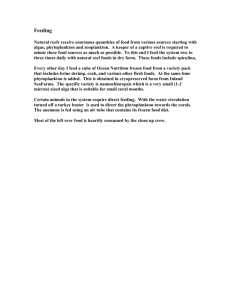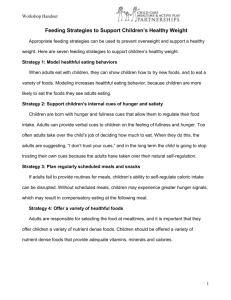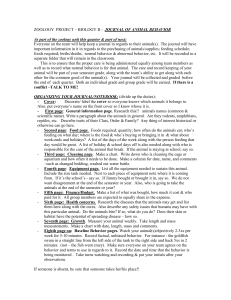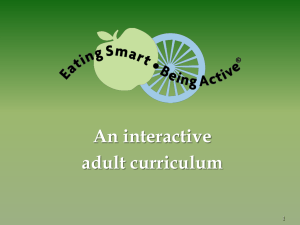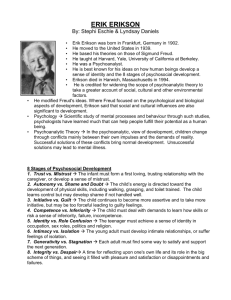Erik Erikson's Psychosocial Stages Application for Children's Eating
advertisement
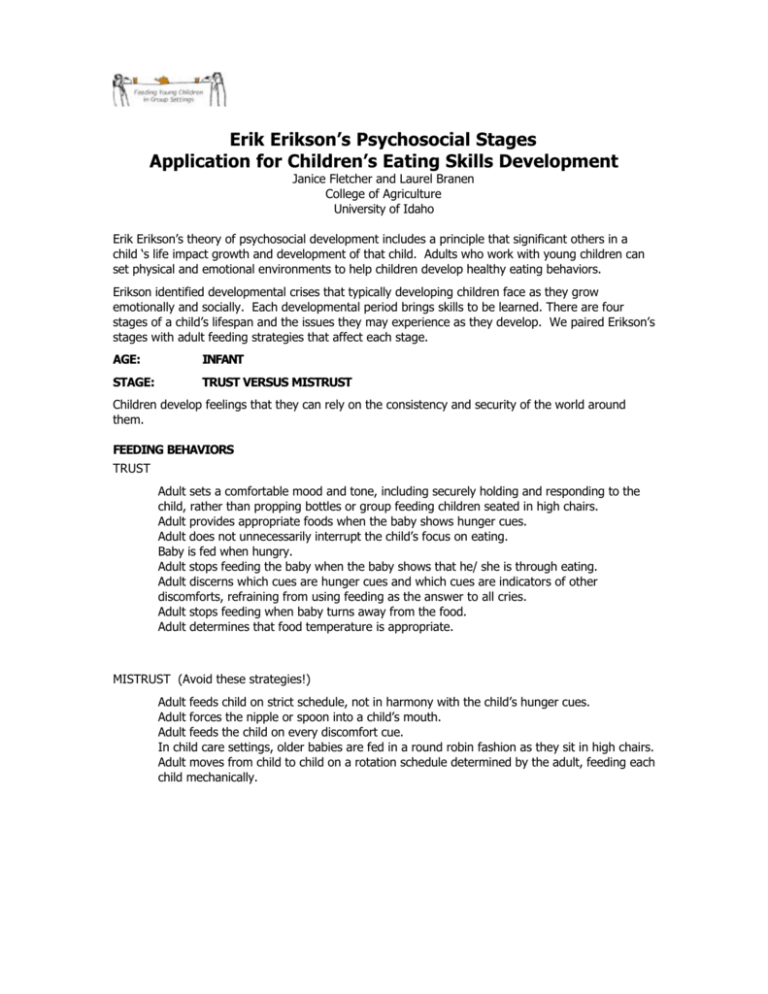
Erik Erikson’s Psychosocial Stages Application for Children’s Eating Skills Development Janice Fletcher and Laurel Branen College of Agriculture University of Idaho Erik Erikson’s theory of psychosocial development includes a principle that significant others in a child ‘s life impact growth and development of that child. Adults who work with young children can set physical and emotional environments to help children develop healthy eating behaviors. Erikson identified developmental crises that typically developing children face as they grow emotionally and socially. Each developmental period brings skills to be learned. There are four stages of a child’s lifespan and the issues they may experience as they develop. We paired Erikson’s stages with adult feeding strategies that affect each stage. AGE: INFANT STAGE: TRUST VERSUS MISTRUST Children develop feelings that they can rely on the consistency and security of the world around them. FEEDING BEHAVIORS TRUST Adult sets a comfortable mood and tone, including securely holding and responding to the child, rather than propping bottles or group feeding children seated in high chairs. Adult provides appropriate foods when the baby shows hunger cues. Adult does not unnecessarily interrupt the child’s focus on eating. Baby is fed when hungry. Adult stops feeding the baby when the baby shows that he/ she is through eating. Adult discerns which cues are hunger cues and which cues are indicators of other discomforts, refraining from using feeding as the answer to all cries. Adult stops feeding when baby turns away from the food. Adult determines that food temperature is appropriate. MISTRUST (Avoid these strategies!) Adult feeds child on strict schedule, not in harmony with the child’s hunger cues. Adult forces the nipple or spoon into a child’s mouth. Adult feeds the child on every discomfort cue. In child care settings, older babies are fed in a round robin fashion as they sit in high chairs. Adult moves from child to child on a rotation schedule determined by the adult, feeding each child mechanically. Erik Erikson’s Psychosocial Stages (cont.) AGE: TODDLER STAGE: AUTONOMY VERSUS SHAME AND DOUBT Children have a sense that they exist as separate human beings. “I am! Look at ME,” is the phrase to describe this stage. FEEDING BEHAVIORS Autonomy Children are encouraged to feed themselves, regardless of mess. Children may say no to foods. Children may combine foods in the way they decide. Children may go on food jags. Child-sized portions of food are presented. Food is served to children so that they can be successful, rather than frustrated. For example, pizza is cut into bite-sized pieces, rather than served as a slice. SHAME AND DOUBT (Avoid these strategies.) Adult feeds children even though the children have adequately developed grasps and finger control. Adult takes over feeding when the children are eating messily. Adult excessively interrupts the children’s eating for hand and face-wipings. Adult forces children to clean their plates and to eat all foods, with little regard to the children’s hunger or satiety cues or individual preferences. Adult serves child’s plate with adult sized portions. AGE: EARLY CHILDHOOD STAGE: INITIATIVE VERSUS GUILT Child have a sense of taking risks as a safe behavior. “I will try” is the phrase that shows a healthy sense of initiative. FEEDING BEHAVIORS INITIATIVE Adult accepts child’s decision to stop eating when the child says, “I’m full.” Adult encourages child to determine how much, if any, of a new food to try. Adult respects child’s ability to dislike or like a new food. Food is presented to the children so that they can serve themselves, deciding how much to put on their plates. Spills are expected and treated as routine, rather than crisis. Child sized utensils are provided so the child can more easily develop skills for feeding and serving self. GUILT (Avoid these strategies.) Child is chastised when her/she grows fatigued and sloppily uses utensils. Adult scolds children for not cleaning their plates. Child fails using utensils that are too big or heavy for his/her strength, balance, and endurance. Child is scolded for spills. Adult chastises or shows disappointment when a child shows dislike of foods. Adult puts more on child’s plate than the child can comfortably eat. Erik Erikson’s Psychosocial Stages (cont.) Age: MIDDLE CHILDHOOD Stage: INDUSTRY VERSUS INFERIORITY Children develop feelings that they can make things, a sense of “I am capable.” FEEDING BEHAVIORS INDUSTRY Child discerns when he or she is hungry or full and acts on these cues. Environment is set so the children can make their snacks or simple meals. Children choose menus for meals. Children make suggestions for trying new foods. Children prepare foods for sharing with friends. Children help set schedules for mealtimes. INFERIORITY (Avoid these strategies.) Children’s plates are pre-served. Adult admonishes and demeans child’s attempts at making or serving food. Children are required to clean their plates. Children are required to taste everything at the mealtime.
